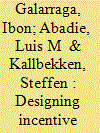|
|
|
Sort Order |
|
|
|
Items / Page
|
|
|
|
|
|
|
| Srl | Item |
| 1 |
ID:
171424


|
|
|
|
|
| Summary/Abstract |
Improved energy efficiency can help reduce pollution, contribute to energy security, and help consumers save money. This paper explores energy labelling schemes as a policy instrument for promoting energy-efficient cars in Spain. Specifically, it explores consumer responses to changes in vehicle prices. We derive the demand responses for two different efficiency labelling schemes: absolute and relative. To that end, we calculate own- and cross-price elasticities of demand for cars with efficiency labels on the Spanish car market. The results show that the elasticities for more efficient cars are in general higher. However, in the specific case of sedans, the elasticities depend on assumptions about how consumers decide which car to purchase. If consumers are concerned about the absolute energy performance of cars independently of other attributes, and thus pay attention to absolute labelling, demand for more efficient cars is more elastic than demand for less efficient cars. If consumers choose the car segment first and then the energy performance, using the relative label, the opposite result is found. The results suggest that both relative and absolute labelling schemes can be useful, depending on how consumers make their decisions. It might also be possible to design a mixed system.
|
|
|
|
|
|
|
|
|
|
|
|
|
|
|
|
| 2 |
ID:
150823


|
|
|
|
|
| Summary/Abstract |
The energy-efficiency gap has been high on research and policy agendas for several decades. Incentive schemes such as subsidies, taxes and bonus-malus schemes are widely used to promote energy-efficient appliances. Most research, however, considers instruments in isolation, and only rarely in the context of political constraints on instrument use, or for alternative policy goals. This paper presents a methodology for the optimal design of incentive schemes based on the minimisation of Dead Weight Loss for different policy goals and policy restrictions. The use of the methodology is illustrated by designing optimal combinations of taxes and subsidies in Spain for three types of appliance: dishwashers, refrigerators and washing machines. The optimal policies are designed subject to different policy goals such as achieving a fixed reduction in emissions or a certain increased market share for efficient appliances, and for policy constraints such as budget neutrality. The methodology developed here can also be used to evaluate past and current incentive schemes.
|
|
|
|
|
|
|
|
|
|
|
|
|
|
|
|
|
|
|
|
|